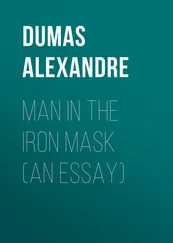George Dover - The True History of the State Prisoner, commonly called the Iron Mask
Здесь есть возможность читать онлайн «George Dover - The True History of the State Prisoner, commonly called the Iron Mask» — ознакомительный отрывок электронной книги совершенно бесплатно, а после прочтения отрывка купить полную версию. В некоторых случаях можно слушать аудио, скачать через торрент в формате fb2 и присутствует краткое содержание. Жанр: foreign_antique, foreign_prose, на английском языке. Описание произведения, (предисловие) а так же отзывы посетителей доступны на портале библиотеки ЛибКат.
- Название:The True History of the State Prisoner, commonly called the Iron Mask
- Автор:
- Жанр:
- Год:неизвестен
- ISBN:нет данных
- Рейтинг книги:5 / 5. Голосов: 1
-
Избранное:Добавить в избранное
- Отзывы:
-
Ваша оценка:
- 100
- 1
- 2
- 3
- 4
- 5
The True History of the State Prisoner, commonly called the Iron Mask: краткое содержание, описание и аннотация
Предлагаем к чтению аннотацию, описание, краткое содержание или предисловие (зависит от того, что написал сам автор книги «The True History of the State Prisoner, commonly called the Iron Mask»). Если вы не нашли необходимую информацию о книге — напишите в комментариях, мы постараемся отыскать её.
The True History of the State Prisoner, commonly called the Iron Mask — читать онлайн ознакомительный отрывок
Ниже представлен текст книги, разбитый по страницам. Система сохранения места последней прочитанной страницы, позволяет с удобством читать онлайн бесплатно книгу «The True History of the State Prisoner, commonly called the Iron Mask», без необходимости каждый раз заново искать на чём Вы остановились. Поставьте закладку, и сможете в любой момент перейти на страницу, на которой закончили чтение.
Интервал:
Закладка:
His weak and timid master followed implicitly his counsels; but appears to have been himself in the intention of acting fairly and faithfully by the French Government. The first intimation that is given in the correspondence of the suspicions, with regard to the conduct of Matthioli, occurs in a letter from Pomponne 55to Matthioli himself, dated February 21st, 1679, in which he says that Lewis “is unwilling to doubt that the promise which has been so solemnly made 56him will not be kept;” an expression which certainly seems to imply, that some doubt did exist in the mind of Lewis and of his ministers upon the subject.
The next is an elaborate and skilful letter of Estrades to Matthioli, written on the 24th of March, 1679, 57from Turin, where he was then awaiting the execution of the treaty, in which he mingles promises and threats to encourage him to perform his stipulations; and shows sufficiently his suspicions to the object of them, to frighten him; at the same time leaving open the hope of forgiveness in case of future good conduct.
By the subsequent letters 58of Pomponne to Pinchesne, it appears, that the treachery of Matthioli soon became more apparent. Indeed, Estrades, during his stay at Turin, obtained the most indubitable evidence of the fact; for the Duchess of Savoy 59showed to him the copies of all the documents relative to the negociation respecting Casale, which Matthioli had given to the President Turki, one of her ministers who was in the interests of Spain, when he passed through Turin on his return from Paris. 60From Turki, as it subsequently appeared, Matthioli had received a sum of money for his information. 61
Meanwhile Asfeld was arrested by the orders of the Count de Melgar, the Spanish Governor of the Milanese, as he was on his way to the rendezvous at Incréa; and Matthioli was the first person who acquainted the French agents with this misfortune, 62as well as with the fact that the Duke of Mantua had been obliged to conclude a treaty with the Venetians, in a directly contrary sense to the one he had first entered into with France; 63“having probably been,” as Pomponne remarks, in a letter to Pinchesne, 64“himself the sole author of the accidents and impediments he acquaints us with.”
Upon the arrival of the intelligence at Paris, of the arrest of Asfeld, the French ministers, though their suspicions of Matthioli were now changed into certainties, being still anxious, if possible, to get possession of Casale, empowered Catinat to supply his place, and to conclude the ratification of the treaty. Intelligence of this change was conveyed to Matthioli in a letter 65from Pomponne, of the date of March 14th, 1679.
Catinat accordingly went, on the appointed day, from Pignerol to Incréa, accompanied by St. Mara, 66the Commandant of that part of the fortress of Pignerol, which was appropriated for a state prison, and by a person of confidence, belonging to the embassy of Estrades. But the appointed day passed over, without bringing Matthioli to Incréa; and the next morning Catinat was informed that his arrival there was discovered; that the peasants of the neighbourhood were in arms; and that a detachment of cavalry was on its way, for the purpose of seizing upon him and his companions. What became of the latter does not appear, except that they escaped the threatened danger; but he himself got away secretly, and in disguise, to Casale; where he gave himself out as an officer of the garrison of Pignerol. The Governor there, who was well-disposed to the French interest, received him with great civility; and, at a dinner he gave to him, joined in drinking the King of France’s health with enthusiasm. 67The next day Catinat was too happy to return undiscovered to Pignerol.
Matthioli, meanwhile, instead of keeping his engagement at Incréa, had returned to Venice, and had had several interviews with Pinchesne, the particulars of which we are unacquainted with, as the letters containing the accounts of them, though alluded to by M. de Pomponne 68in his answers, have not been published.
Pinchesne was, at this time, convinced of the perfidy of Matthioli, having, in addition to various other suspicious circumstances, discovered that he had been secretly at Milan for some days. He, however, did not think it advisable entirely to break with him; but advised him to go and confer with Estrades, at Turin; representing to him the danger to which he exposed himself if this affair failed of success through his fault. 69Matthioli followed the advice of Pinchesne to his own ruin, and going to Turin, presented himself forthwith to Estrades, 70to whom he offered many insufficient excuses for his delay.
The vindictive Lewis had, meanwhile, determined to satisfy his wounded pride and frustrated ambition, by taking the most signal vengeance of Matthioli; as we find by the following note from Louvois to his creature, St. Mars, dated, St. Germain, April 27th, 1679. – “The King has sent orders to the Abbé d’Estrades, to try and arrest a man, with whose conduct his Majesty has reason to be dissatisfied; of which he has commanded me to acquaint you, in order that you may not object to receiving him when he shall be sent to you; and that you may guard him in a manner, that not only he may not have communication with any one, but that also he may have cause to repent of his bad conduct; and that it may not be discovered that you have a new prisoner.” 71
Nothing therefore could be more opportune to Estrades, than the arrival of Matthioli at Turin, and accident soon enabled him to lay a successful plan for executing the wishes of the French monarch. The plan he is said to have communicated to the Duchess of Savoy, who consented to the arrest taking place, but objected to its happening on her territories. 72
Matthioli complained much of want of money, occasioned by the expenses of his journies, and the bribes he had been obliged to offer to the Duke’s mistresses. Estrades took this opportunity of forwarding his scheme, by telling him that Catinat, who, under the name of Richemont, commanded the troops destined to take possession of Casale, had considerable sums at his disposal, which he would be happy to make so good a use of as in ministering to his wants; provided he, Matthioli, would give him a meeting on the frontier towards Pignerol, at which also Estrades would be present. 73Of course, the reason assigned for naming the frontier as the place of rendezvous was, that Catinat could not leave the neighbourhood where his troops were stationed.
To this proposition Matthioli readily consented; and having first made a journey to Casale, he returned and met Estrades (who was accompanied on this expedition by his relation the Abbé de Montesquiou) by appointment, in a church half a mile from Turin, from whence they proceeded together to the frontier. At three miles from the place of rendezvous they were stopped by a river, of which the banks were overflowed, and the bridge broken. Matthioli himself assisted in repairing the bridge, which was to convey him to his captivity; 74and they then proceeded on foot to the place where Catinat awaited them accompanied only by two officers, the Chevaliers de St. Martin and de Villebois, and by four soldiers of the garrison of Pignerol. 75
Before, however, Matthioli was arrested, Estrades held some conversation with him, and obliged him, in the presence of Catinat, to confess that he had in his possession all the original papers regarding the delivery of Casale, and that they were left in the custody of his wife at Bologna; who was living in the convent of the nuns of St. Thomas 76in that city. This was necessary, because Matthioli had lately refused to give them up to the Duke his master, 77alleging that he no longer knew where they were. His confession, upon this occasion, afterwards turned out to be false, and that the papers in question were concealed in a wall at Padua. 78
Читать дальшеИнтервал:
Закладка:
Похожие книги на «The True History of the State Prisoner, commonly called the Iron Mask»
Представляем Вашему вниманию похожие книги на «The True History of the State Prisoner, commonly called the Iron Mask» списком для выбора. Мы отобрали схожую по названию и смыслу литературу в надежде предоставить читателям больше вариантов отыскать новые, интересные, ещё непрочитанные произведения.
Обсуждение, отзывы о книге «The True History of the State Prisoner, commonly called the Iron Mask» и просто собственные мнения читателей. Оставьте ваши комментарии, напишите, что Вы думаете о произведении, его смысле или главных героях. Укажите что конкретно понравилось, а что нет, и почему Вы так считаете.












